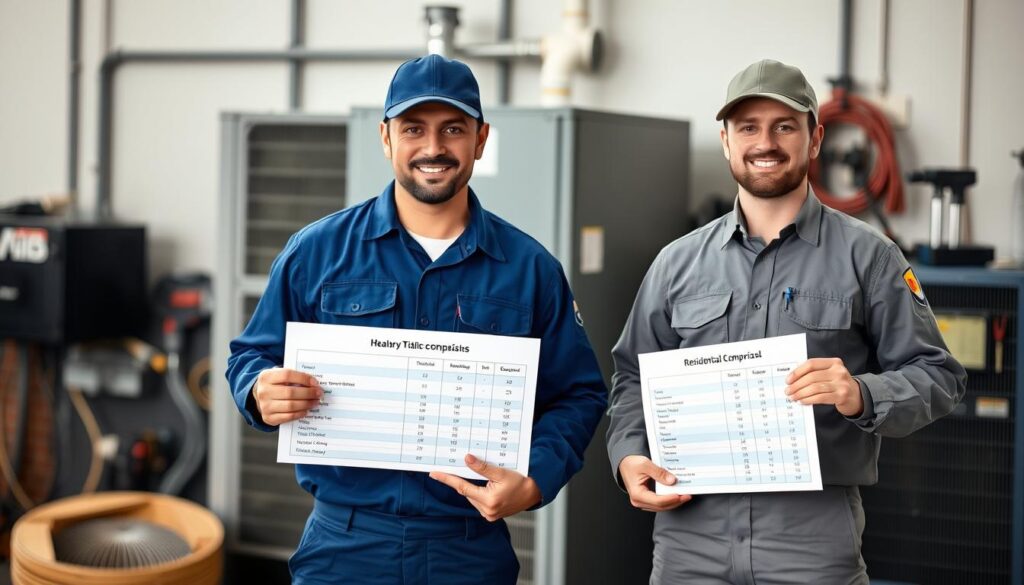Affiliate Disclosure
HVAC Guide Guys is a participant in the Amazon Services LLC Associates Program, an affiliate advertising program designed to provide a means for sites to earn advertising fees by advertising and linking to Amazon.
How Much Does An HVAC Tech Make A Year? Ever wondered how much HVAC technicians make? The field of heating, ventilation, and air conditioning is more lucrative than many think.

Knowing the yearly earnings of HVAC techs can change your career plans. The salary for HVAC technicians changes based on experience, location, and specialty.
This detailed salary guide will reveal the financial aspects of HVAC careers. Whether you’re starting out or looking to move up, understanding the pay can guide your choices.
Key Takeaways
- Average HVAC technician salary ranges between $46,000 and $68,000 annually
- Earnings vary significantly based on experience and geographic location
- Certifications and specializations can boost income
- Entry-level positions offer competitive starting wages
- Career growth opportunities exist in multiple sectors
Table of Contents
National Average HVAC Technician Salary Overview
Understanding hvac wages is key to your career in heating, ventilation, and air conditioning. The HVAC field offers good pay for different skills and experience levels.
Exploring hvac income shows several factors affect your pay. The national scene offers a wide range of salary chances for skilled workers.
Base Salary Ranges
HVAC technicians see different salary ranges based on various factors:
- Entry-level positions: $31,000 – $40,000 annually
- Mid-career technicians: $45,000 – $60,000 annually
- Experienced professionals: $65,000 – $80,000 annually
Median Annual Earnings
The median salary for HVAC technicians is $50,590 per year. This means they make about $23.43 per hour. It’s the middle point where half make more and half make less.
Top and Bottom Percentiles
Salaries in HVAC vary a lot:
- Bottom 10%: Around $31,000 per year
- Top 10%: Approximately $80,000 per year
Your pay depends on your skills, certifications, location, and HVAC specialization.
How Much Does An HVAC Tech Make A Year By Experience Level
Your earnings as an HVAC technician can really grow with experience. Knowing how salaries increase helps you plan your career and set income goals.
At the start, HVAC techs earn less. In the first two years, you can make about $54,100. This time is for learning the basics and getting hands-on experience.
- First 0-2 years: Learning core technical skills
- Developing hands-on experience with different HVAC systems
- Working under supervised conditions
After 2-4 years, your earnings go up to about $65,700. You’ll get better at complex jobs and become more skilled.
With 4-7 years of experience, you can earn around $77,200. You’ll have specialized skills and be more valuable to employers.
- Advanced troubleshooting capabilities
- Increased efficiency in project completion
- Potential for leadership responsibilities
Your earnings grow with learning, skill improvement, and experience. Getting certifications and keeping up with new tech can help you earn more.
“Experience transforms an HVAC technician from a novice to a highly sought-after professional.” – Industry Expert
Explore Our HVAC Shop
Looking for top-rated HVAC tools, parts, and accessories? Visit our shop and find the perfect solution for your needs.
Visit the ShopGeographic Salary Variations Across States
Your HVAC compensation can change a lot based on where you work in the United States. The place you work in greatly affects how much you earn. Different states and regions have different pay rates for HVAC techs.
Knowing these regional differences can help you make better career choices. It can also help you earn more in the HVAC industry.
Highest Paying States for HVAC Technicians
Some states pay HVAC professionals a lot more. The top states for pay are:
- Alaska: Leads with an impressive average annual salary of $75,660
- Massachusetts: Offers competitive compensation around $72,540
- Washington: Provides strong earnings at approximately $70,300
- New Jersey: Maintains high hvac tech pay rates near $69,880
- District of Columbia: Offers lucrative opportunities around $68,700
Lowest Paying States for HVAC Technicians
On the other hand, some states pay less:
- Florida: Around $46,940 annually
- Mississippi: Approximately $47,230
- Arkansas: Averaging near $48,320
- Alabama: Offer about $49,070
Regional Salary Trends
Regional economic factors greatly affect HVAC technician salaries. Cities usually pay more because of higher demand and costs of living. Coastal and metropolitan regions tend to provide more competitive compensation packages.
“Location can make a substantial difference in your HVAC career earnings.” – Industry Salary Expert
When planning your HVAC career, look into local market conditions. Understand the demand and what you can earn in different places.
Explore Our HVAC Shop
Looking for top-rated HVAC tools, parts, and accessories? Visit our shop and find the perfect solution for your needs.
Visit the ShopMajor Metropolitan Areas and Their HVAC Salaries

Your salary as an HVAC technician can change a lot based on where you work. Cities offer great chances for technicians to earn well. San Francisco and New York City are the best places for making good money in HVAC.
The top cities for HVAC technician salaries are:
- San Francisco: $64,200 entry-level salary
- New York City: $60,600 average starting wage
- Los Angeles: $55,800 median annual earnings
- Chicago: $52,400 typical technician compensation
- Washington D.C.: $58,700 metropolitan salary range
Working in cities has its perks for HVAC pros. Higher population density means more need for HVAC services. Cities have more complex systems, leading to better pay.
Professional HVAC technicians in major metropolitan areas can expect significantly higher earnings compared to rural counterparts.
What affects HVAC salaries in cities includes:
- Cost of living
- Local economic conditions
- Commercial and residential construction rates
- Technological infrastructure complexity
- Regional climate variations
When planning your HVAC career, think about these salary differences. Look into local markets, understand what’s needed, and aim for the best financial opportunities.
Impact of Certifications on HVAC Income
Certifications are key to how much an HVAC technician can earn. They can greatly increase your salary and open new doors in the field.
Knowing which certifications to get is important. They show you’re skilled and dedicated to quality work.
Required Certifications
Some certifications are needed for HVAC technicians to work legally:
- EPA 608 Certification (Clean Air Act requirement)
- State-specific licensing credentials
- OSHA safety certifications
Optional Certifications That Boost Pay
Getting extra certifications can really up your salary:
- NATE (North American Technician Excellence) – A top industry certification
- HVAC Excellence Professional Level Certification
- R-410A Refrigerant Handling Certification
Specialization Benefits
Specializing in certain areas can make a big difference in your earnings. Certifications in commercial systems, energy efficiency, or green tech can make you stand out.
Pro Tip: Keep learning and getting certified to boost your value and earnings.
By choosing the right certifications, you can move up in your career and earn more in the HVAC field.
Explore Our HVAC Shop
Looking for top-rated HVAC tools, parts, and accessories? Visit our shop and find the perfect solution for your needs.
Visit the ShopCommercial vs Residential HVAC Technician Pay Differences

When looking at HVAC income, it’s key to know the pay gap between commercial and residential sectors. Commercial HVAC jobs usually pay more because they are more complex and require special skills.
Commercial HVAC techs earn more because they handle complex systems. They work on big projects in offices, hospitals, and factories. These jobs need advanced technical skills and specific knowledge.
- Commercial HVAC systems are more complex and require advanced technical expertise
- Residential work involves smaller, more straightforward installations
- Specialized commercial training can significantly boost earning
The pay gap between commercial and residential HVAC work is big. Techs working on commercial projects get paid more. This is because these jobs are more complex and challenging.
| HVAC Sector | Average Annual Salary | Skill Level Required |
|---|---|---|
| Residential HVAC | $45,000 – $65,000 | Intermediate |
| Commercial HVAC | $55,000 – $85,000 | Advanced |
Understanding these pay differences can help your HVAC career. Investing in advanced commercial HVAC training can open up better pay and more challenging work.
Explore Our HVAC Shop
Looking for top-rated HVAC tools, parts, and accessories? Visit our shop and find the perfect solution for your needs.
Visit the ShopCareer Advancement and Salary Growth
Your HVAC career offers exciting opportunities for growth and increased earnings. As you gain experience and develop specialized skills, multiple pathways can significantly boost your income.
Advancing in the HVAC industry means exploring different career trajectories. These can enhance your earnings. Skilled technicians can progress beyond entry-level positions through strategic career moves.
Management Positions
Transitioning into management roles represents a significant opportunity for salary growth. HVAC supervisors with extensive experience can earn substantially higher wages:
- Supervisory roles typically require 5-7 years of field experience
- Average annual earnings for HVAC managers range from $75,000 to $95,000
- Leadership positions demand strong technical and communication skills
Business Ownership Options
Entrepreneurial HVAC technicians can maximize their earning by starting their own businesses. Successful HVAC company owners can generate significantly higher incomes compared to traditional employment.
- Initial investment required for business startup
- Potential for multiple revenue streams
- Greater control over pricing and service offerings
Specialized Roles
Developing expertise in niche areas can dramatically increase your market value. Specialized HVAC professionals often command premium rates for their advanced skills:
- Energy Efficiency Consultants
- Industrial HVAC System Designers
- Commercial Refrigeration Specialists
- Building Automation Experts
By strategically planning your career path and continuously upgrading your skills, you can unlock substantial earning in the dynamic HVAC industry.
Benefits and Additional Compensation
When looking at hvac compensation, smart technicians know there’s more than just a base salary. The total pay includes a package of extra benefits that can really increase your earnings.
Most HVAC companies have great benefit packages to draw in and keep the best workers. These packages offer more than just money. They give you financial security and help you balance work and life.
- Health Insurance Coverage
- Medical plans
- Dental coverage
- Vision care options
- Retirement Planning
- 401(k) matching programs
- Company pension plans
- Investment opportunities
- Financial Incentives
- Performance bonuses
- Overtime pay
- Profit-sharing programs
Your total compensation package might also include things like paid vacation, chances to grow professionally, and money for equipment. Skilled HVAC technicians who negotiate for these benefits can really increase their yearly income.
Some employers also offer special perks like help with education, reimbursement for certifications, and chances to move up in your career. These benefits add value and help you grow in the HVAC field over time.
Industry Growth and Future Salary Projections
The HVAC industry is on the verge of big changes. This means great chances for technicians to boost their earnings. The outlook for job growth is very positive.
The Bureau of Labor Statistics predicts a 9% increase in HVAC technician jobs by 2033. This means about 37,700 new positions every year. It shows a strong need for skilled workers.
Market Demand Driving Expansion
Several factors are driving the HVAC industry’s growth:
- More homes and buildings are being built.
- There’s a bigger focus on energy-saving systems.
- The need for climate control technologies is rising.
Technological Influence on Earnings
New technologies are changing how much HVAC technicians earn. Those who learn about smart home tech and green systems can earn more.
Economic Factors Shaping Salaries
Your salary will depend on several economic factors:
- The health of the local economy.
- Development in the area’s infrastructure.
- Investments in sustainable energy.
Stay adaptable and keep learning new skills to take advantage of HVAC industry opportunities.
Explore Our HVAC Shop
Looking for top-rated HVAC tools, parts, and accessories? Visit our shop and find the perfect solution for your needs.
Visit the ShopFactors Affecting HVAC Technician Earnings
Figuring out how much an HVAC tech makes a year involves looking at several key factors. Your salary isn’t just based on one thing. It’s a mix of many professional aspects.
Where you work greatly affects your pay. Different places have different pay rates. This is because of local demand and the economy.
- Experience level dramatically impacts salary
- Specialized certifications can increase earning power
- Type of employer affects compensation packages
- Industry specialization creates unique income opportunities
Your skills and qualifications greatly influence your salary. New technicians usually earn less. But, those with more experience and certifications can earn a lot more.
| Factor | Potential Salary Impact |
|---|---|
| Years of Experience | 10-30% salary increase per 5 years |
| Advanced Certifications | 5-15% salary boost |
| Specialization | Up to 25% higher earnings |
Employers look for technicians who keep learning. Investing in professional development can lead to higher salaries.
Success in the HVAC industry comes from strategic skill enhancement and adaptability.
Your career path depends on managing these factors well. By understanding and working on these points, you can increase your earnings in the HVAC field.
Conclusion
Exploring HVAC careers means understanding how much you can earn. The industry offers salaries from $46,000 to $68,000. Your earnings can grow with skills, experience, and specialization.
Success in HVAC goes beyond just salary. Things like certifications, where you work, and your specialty matter a lot. Getting advanced training and focusing on a specific area can make you more valuable and increase your pay.
The HVAC field is expanding, thanks to new tech and the need for energy-saving systems. This growth means more job security and chances for career growth. By keeping up with trends, learning new skills, and being open to different work settings, you can reach your full career and financial goals.
Your HVAC career is about more than money. It’s a field that offers personal fulfillment, technical challenges, and the chance to build a fulfilling career. Whether you’re new or looking to move up, HVAC offers many ways to grow personally and financially.

